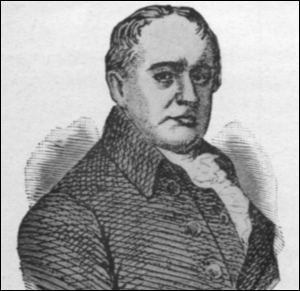1764-1844
Associate Justice of the New York Supreme Court of Judiciature, 1798-1804
Jacob Radcliff was born in Rhinebeck, Dutchess County, on April 20, 1764. He graduated from Princeton in 1783, and studied law in the office of Egbert Benson, New York’s first Attorney General. Radcliff was admitted to the bar in 1786 and set up a legal practice in Poughkeepsie.
Radcliff represented Dutchess County in the Assembly in the years 1794 and 1795. In January 1796, he was appointed an assistant Attorney General for the district of Orange, Dutchess and Ulster counties.
Jacob Radcliff was appointed an Associate Justice of the Supreme Court of Judicature on December 27, 1798 and, in November 1799, he presided at the trial of David Frothingham, the printer of the Argus newspaper who was charged with criminal libel of General Alexander Hamilton (People v. Frothingham, 1799). He also presided at the famous trial of Francis Mezzara on charges of criminal libel in 1817 (1 American State Trials 60). In 1800-1801, Jacob Radcliff and fellow Supreme Court Justice James Kent were appointed to produce a recompilation of the New York statutes. Their work was enacted by the Legislature in 1801, and published as a two-volume work entitled Laws of the State of New York (1802).
Justice Radcliff resigned from the Supreme Court bench in January 1804, and devoted himself to his legal practice in the Court of Chancery. Some years later, on February 13, 1810, he was appointed Mayor of New York City. He became Mayor again on July 10, 1815 and on both occasions, he replaced DeWitt Clinton. Jacob Radcliff represented New York City at the 1821 Constitutional Convention, and took an active role in the debates. On January 1842, he was appointed by the United States Circuit and District Courts as a Commissioner under the General Bankrupt Act.
Jacob Radcliff died on May 6, 1844 at his daughter’s home in Troy, New York. The third edition of Johnson’s Cases included Justice Radcliff’s notes and, in a review of this work, the New York Legal Observer states:
We knew Mr. Justice Radcliff personally. His mind was imbued with learning and equity. Justice and right were the polar stars of his decisions, and while he was on the bench no man who sat as a judge ever was or could be in more public favor. We hope that the last edition of Johnson’s Cases will share the favor of the profession, and we are sure that whoever reads them will find his pains well rewarded.
Sources
Ralph J. Caliendo. New York City Mayors, p 190 (2010).
“The People v. Frothingham – Libel on General Hamilton.” 3 Am. L.J. 184 (1810).

